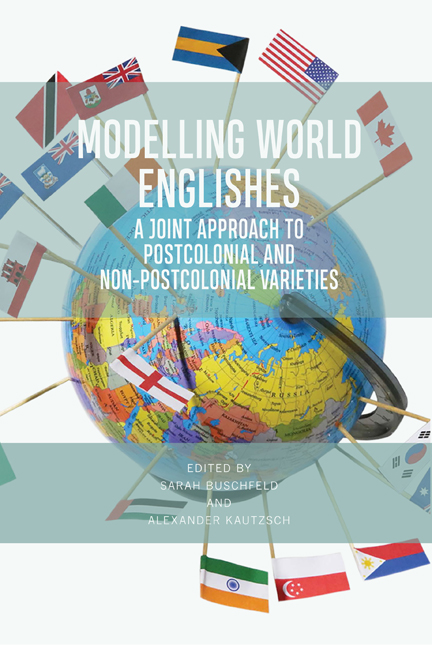Book contents
- Frontmatter
- Contents
- List of Figures and Tables
- List of Contributors
- Foreword
- 1 Introduction
- 2 English in England: The Parent Perspective
- 3 English in Namibia: Multilingualism and Ethnic Variation in the Extra- and Intra-territorial Forces Model
- 4 English in the United Arab Emirates: Status and Functions
- 5 English in India: Global Aspirations, Local Identities at the Grassroots
- 6 English in Singapore: Two Issues for the EIF Model
- 7 English in the Philippines: A Case of Rootedness and Routedness
- 8 English in South Korea: Applying the EIF Model
- 9 English in Japan: The Applicability of the EIF Model
- 10 English in Australia – Extra-territorial Influences
- 11 English in North America: Accounting for its Evolution
- 12 English in The Bahamas and Developmental Models of World Englishes: A Critical Analysis
- 13 Standard English in Trinidad: Multinormativity, Translocality, and Implications for the Dynamic Model and the EIF Model
- 14 Englishes in Tristan da Cunha, St Helena, Bermuda and the Falkland Islands: PCE, non-PCE or both? Blurred Boundaries in the Atlantic
- 15 English in Ireland: Intra-territorial Perspectives on Language Contact
- 16 English in Gibraltar: Applying the EIF Model to English in Non-Postcolonial Overseas Territories
- 17 English in Ghana: Extra- and Intra-territorial Forces in a Developmental Perspective
- 18 Synopsis: Fine-tuning the EIF Model
- Index
14 - Englishes in Tristan da Cunha, St Helena, Bermuda and the Falkland Islands: PCE, non-PCE or both? Blurred Boundaries in the Atlantic
Published online by Cambridge University Press: 24 September 2020
- Frontmatter
- Contents
- List of Figures and Tables
- List of Contributors
- Foreword
- 1 Introduction
- 2 English in England: The Parent Perspective
- 3 English in Namibia: Multilingualism and Ethnic Variation in the Extra- and Intra-territorial Forces Model
- 4 English in the United Arab Emirates: Status and Functions
- 5 English in India: Global Aspirations, Local Identities at the Grassroots
- 6 English in Singapore: Two Issues for the EIF Model
- 7 English in the Philippines: A Case of Rootedness and Routedness
- 8 English in South Korea: Applying the EIF Model
- 9 English in Japan: The Applicability of the EIF Model
- 10 English in Australia – Extra-territorial Influences
- 11 English in North America: Accounting for its Evolution
- 12 English in The Bahamas and Developmental Models of World Englishes: A Critical Analysis
- 13 Standard English in Trinidad: Multinormativity, Translocality, and Implications for the Dynamic Model and the EIF Model
- 14 Englishes in Tristan da Cunha, St Helena, Bermuda and the Falkland Islands: PCE, non-PCE or both? Blurred Boundaries in the Atlantic
- 15 English in Ireland: Intra-territorial Perspectives on Language Contact
- 16 English in Gibraltar: Applying the EIF Model to English in Non-Postcolonial Overseas Territories
- 17 English in Ghana: Extra- and Intra-territorial Forces in a Developmental Perspective
- 18 Synopsis: Fine-tuning the EIF Model
- Index
Summary
INTRODUCTION: FOUR SOCIOLINGUISTIC HISTORIES
This chapter looks at the interplay of extra- and intra-territorial forces that shaped the evolution and sociolinguistic characteristics of four varieties of English spoken in the Atlantic Ocean: Bermuda, St Helena, Tristan da Cunha and the Falkland Islands. Two of them are among the oldest colonial varieties (Bermudian and St Helenian English, established in the sixteenth and seventeenth centuries; Schreier 2008), those on the Falkland Islands and Tristan da Cunha are much younger. With reference to Buschfeld and Kautzsch (2017), I will single out and evaluate general and locally specific forces that operated in the formation of these varieties, with a focus on the nature of various coexisting dialects (ENL, ESL and EFL) in the early contact scenarios that straddle current dividing lines between social and ethnic communities in all four locations.
Crucially, all four involved an ENL founding stock of British founders, ESL-speaking settlers from Continental Europe (France, Scandinavia) and (with the exception of the Falkland Islands) slaves from various locations. Settler groups were small in size yet were characterized by division of labor and social segregation. Various population strands mixed to the extent that for St Helena, Governor Charles Elliot remarked in 1868 that “there can be no position on the face of the earth where it would be more difficult to discriminate between the various strains of blood of which the body of the population is composed than here in St. Helena.” Similarly, the Bermudian population was marked by extremely high mobility within and across the islands, so that qualitative differences are not community-diagnostic and there is now a tapestry of quantitative variation that links individual members and renders it difficult to outline pre-specified speech communities (cf. Eberle 2017). The question of particular interest is how such conditions lend themselves to theorizing and how they fit into current models of English as a world language, which will be explored in detail.
Though the Atlantic Ocean is not generally recognized as a prominent or influential area within the anglophone world, there is little doubt that it is characterized by sociolinguistic heterogeneity. The Caribbean, a vast and utterly complex conglomerate of English (and other) varieties, hosts some of the best-researched Creoles (Jamaican Creole English; Patrick 1999) as well as recently documented varieties (Dominican Kokoy; Aceto 2010).
- Type
- Chapter
- Information
- Modelling World EnglishesA Joint Approach to Postcolonial and Non-Postcolonial Varieties, pp. 298 - 321Publisher: Edinburgh University PressPrint publication year: 2020



